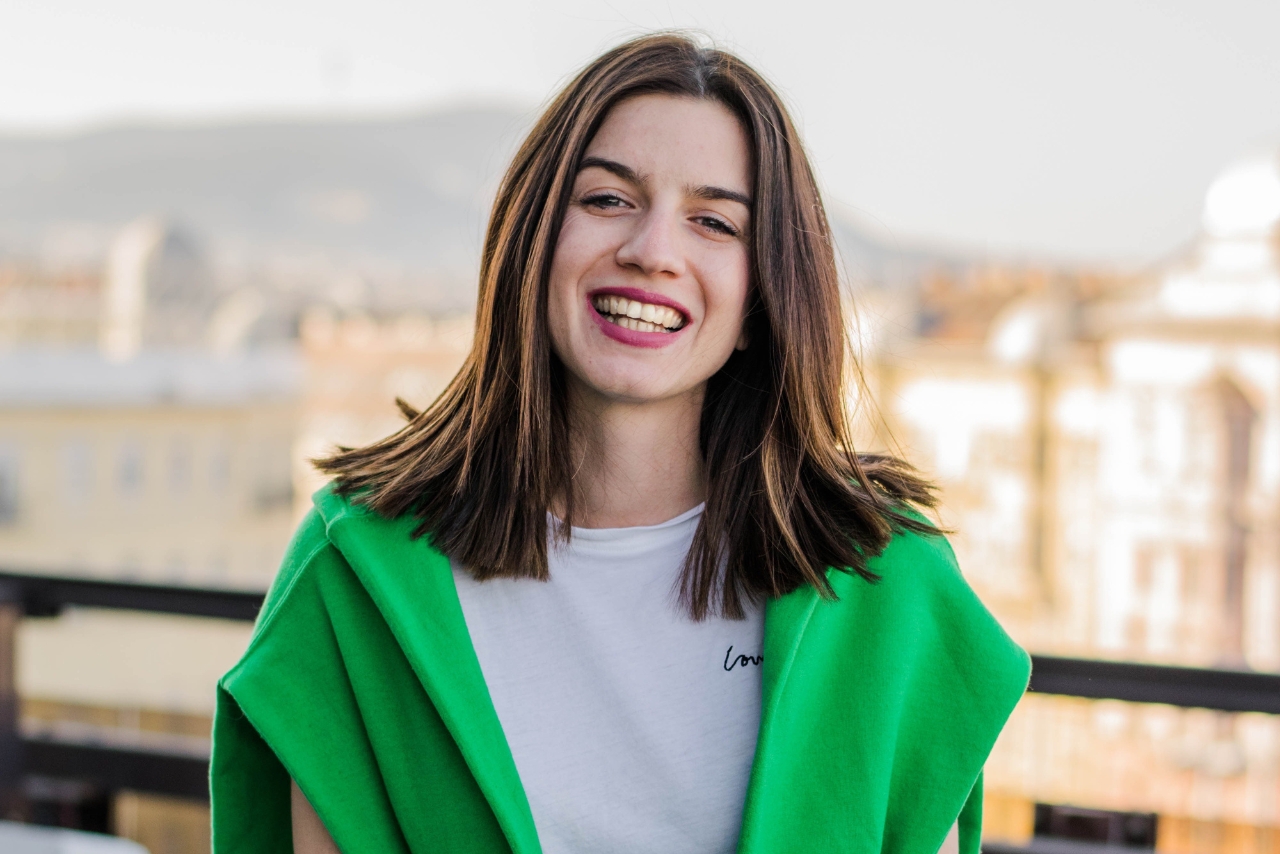Corvinus Alumni: Let every sick child have a companion

Sára Forgács-Fábián, founder and leader of the Amigos for Children Foundation, recalls how her long childhood illness made her realize the importance of having a companion for a hospitalized child—someone to talk to and play with. Today, the foundation operates with 250 volunteers across six major cities in Hungary.
Why did you choose Corvinus, and why did you pursue your bachelor degree in finance and accounting?
My parents are economists—my mother an accountant. As a toddler, I played with invoice books and an old calculator at home while overhearing conversations about balance sheets, debits, and credits. Early on, I vowed not to become an accountant because it seemed dreadful back then. I was a creative child—at eleven, I started Lili Magazin at school. It was highly profitable, selling at a 100% margin for fifty forints. Even teachers bought it, and I even sent sample copies to other schools. Contributors wrote for free because I made it seem like a privilege to be published. My journalism career lasted about a year and a half before I got bored.
But even as a child, you acted like a professional marketer…
Maybe, but at nine, I was hospitalized for a year with a serious illness. A young woman visited me, played with me, and spent time with me. I loved that. After recovery, I decided to become a doctor. Unfortunately, biology and chemistry weren’t my strengths, it would have been completely unrealistic to apply for medical school. I already knew I wanted to create something of my own and was good at bringing people together for successful outcomes.
So why study accounting at Corvinus after all?
I realized that financial knowledge would be useful for any organization I might start. I didn’t enjoy accounting and even considered switching to biology and chemistry to apply to medical school. But I persevered, studied hard, and graduated with distinction.
By the end of my first year, I gathered my friends from Corvinus, and we started visiting the children’s clinic on Tűzoltó Street to help sick kids. We felt, and still believe, that spending time with hospitalized children—through language learning, crafts, and play—makes a big difference for them and their parents. Some children are very lonely in hospitals, and some aren’t visited frequently due to various reasons, including those in state care, who often have no visitors at all. That’s how the Amigos for Children Foundation started. Today, our volunteers operate in Budapest, Debrecen, Szombathely, Szeged, Pécs, and Miskolc, supporting not only families but healthcare staff as well.
We fulfill a significant gap, as even in the wealthiest countries, hospital staff cannot provide everything children need. Companionship is a basic human need, and addressing it is a major challenge. Doctors tell us that our activities also aid recovery.
Volunteering Today: It’s Cool
I heard you pursued your master’s degree in Amsterdam.
Yes, at Vrije University, studying strategic management. Upon returning, I began teaching social startup management at Corvinus and later at Semmelweis University. A nonprofit organization serves societal needs rather than consumer demands, but efficient operations are just as crucial as in a for-profit business. I often say we bring a for-profit mindset into the nonprofit sector. Transparency is key for us. This is especially important because it benefits the financial supporters of a nonprofit organization to know exactly how their donated money is being spent. All our financial data is public, contrary to advice from some to keep it hidden. This approach reassures donors that their money is well spent. Despite warnings that I’d struggle financially in the nonprofit sector, I’ve shown it’s possible to run a nonprofit professionally and sustainably, so that the employees don’t have to wear worn-out clothes. My PhD focuses on the growth of community-based civil organizations.
What’s the most important thing you learned at Corvinus?
While accounting is essential, the main takeaway was learning at Corvinus how to think critically and structure solutions. Corvinus convinces you that you can achieve anything, and that’s true—whether you end up in the film industry, banking, or even heavy industry. Curious people thrive here.
Where do you find your volunteers, and how is volunteering perceived today? A decade ago, many people didn’t want to believe that there are those who work without pay for a good cause…
Volunteering is now considered cool. When I was a freshman, it was stereotyped as an activity for socially awkward people. Today, there’s a waiting list for our program, with twice as many applicants as we can accept. We only recruit from higher education because it’s important for our Amigos to be close in age to the children and serve as an older sibling figure. Of course, several Amigos work with one child.
What caused this shift?
In our individualistic world, young people still crave community. They want to live and exist in a supportive network, but community has simply become a rare commodity. Our clearly defined goals and mentorship appeal to them. I often say we offer both responsibility and opportunity. This keeps our volunteers committed. The activities range from crafts to creating learning materials. Our volunteers even co-authored a book series introducing children to 17 countries – e. g. South-Korea, Portugal, Jordan – through fun, engaging content. During tough moments, like the loss of a child, we provide emotional support, as such experiences deeply impact our volunteers.
What do you love most about this work?
Helping others. Volunteering helps the volunteer too. I’m proud of building an organization that reflects the world we want to live in. When I moved to Amsterdam, six people applied to lead the foundation in my absence. We chose two collaboratively, and the other four stayed on enthusiastically, prioritizing our mission over personal ambition. Seeing Corvinus students start similar initiatives inspires me. I hope for more grassroots efforts to enrich our society, because when the pie grows, everyone benefits.
Katalin Török